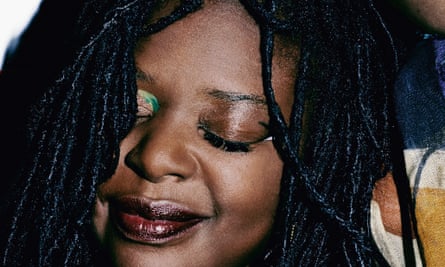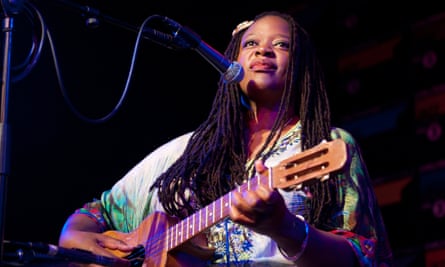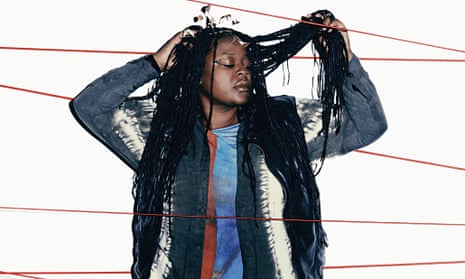Glance at the credits on Eska Mtungwazi’s Mercury-nominated debut album ESKA, and you’ll wonder if she’s perfected the art of self-cloning. She’s written all the songs, with a few co-writers here and there, and performs lead and backing vocals, but then that’s the deal with singer-songwriters. But supplying wurlitzer, harmonium, clarinet and tambourine, too – all on one song? Strings, cuatro, hand percussion, glockenspiel and grand piano on another? Skank organ? Rocks? (By the way, she also has a maths degree from the LSE.)
Apart from anything else, such range speaks of enormous self-confidence. And yet, she explains to me as we sit soaking up the last bit of autumn sun in Shoreditch, that’s not the whole story. Although she’s never lacked faith in her musical ability – “I had a healthy ego for that!” she laughs – believing that she could move from a highly successful career as a vocalist on other people’s work to flourish as a solo musician was a different matter. “When I try to envision who I was,” she says of her past self, “I see this scared little mouse who just wants to have a bit of cheese.”
Now 44, she’s worked for many years with artists of immense stature, including Grace Jones, Nitin Sawhney, Bobby McFerrin and Courtney Pine. But always playing on someone else’s team had its drawbacks. “While I’m very proud of my back catalogue,” she explains, “it’s tended to overshadow anything of my own. And constantly being assessed by your previous collaborations can be very hard. I’m looking forward to the day where the first few lines of an interview aren’t listing all the collaborations I’ve done.”
But with her Gatekeeper EP, released in 2013 on Earthling Recordings, the label she set up in her kitchen, and now her first full-length album, ESKA, she has garnered high-profile fans such as Gilles Peterson and Jamie Cullum. At the end of the month, she will go up against the likes of Aphex Twin, Jamie XX and Florence + the Machine to contest one of Britain’s foremost music prizes. Recently iconoclastic designer Rick Owens chose her to perform at his headline-grabbing show at Paris Fashion Week. So why would the engaging, clever and highly articulate woman sitting in front of me lack confidence? As we talk, it becomes clearer why it’s taken Eska a little while to fight her way out of various boxes.
First there’s her unwillingness to submit to the music industry’s determination to shoehorn artists into compartments. She had enormous doubt about whether she would be embraced as a solo artist for several reasons – her size, age and colour. “It’s been a huge battle for me. It’s been one of the things, actually – feeling I’m not going to be accepted for the way I look.” For years she bought clothes that were too small for her (she is plus size) with the idea that she’d wait until she fitted into them before putting herself forward. “I’m not joking you – I deferred my life for years in terms of engaging with industry matters because I just thought: ‘I don’t want to be laughed at.’”

Her music also defies categorisation. Hers is a voice that swoops and soars, trembles and declaims against a sonic backdrop that you’d be hard pressed to describe as folk, or psychedelic, or electronic, or soul, but which has elements of each. Bridling at the very idea of genre, the singer says that when she was told ESKA would probably end up under Soul/R&B: “I remember feeling really quite nauseous. But the thing is going to be dropped in a box whether I like it or not.”
If she had to put herself in a genre, what would it be? “What genre is Scott Walker in?” she replies, citing possibly the weirdest career trajectory – from poster-boy crooner to avant-gardist – in musical history. “That’s where I wanna be.”
Her magpie eclecticism started early. She grew up in south-east London to Zimbabwean parents who came to England when she was two. On Sundays her father, a teacher, would get out his vinyl collection and play “anything and everything. It was a really crazy mixture.” He’d stand around dancing to Quincy Jones – one of her big inspirations – and occasionally pick up a guitar he couldn’t play. Meanwhile his kids, resigned to not watching cartoons on TV, pored over record sleeves, marvelling at how it could take 50 people to make three-and-a-half minutes of sound.
Luckily her school had an “incredible” music department, with none of the “dumbing down” she fears afflicts some contemporary music teaching: “I was given an opportunity to learn about things outside of my social circle; given choices. I got to play the violin, the cello. My teachers helped me to get a scholarship to the Conservatoire. But in tandem we were doing Bob Marley.” She revelled in the freedom afforded to her at home and school, moving easily from Marley to madrigals. “I was a total sponge, a sucker. And I loved being able to play in an orchestra and jam in a band.”
Her parents didn’t intend to settle in England forever; many Zimbabweans of their generation came primarily to gain a British degree and return home. But they never did return and, a couple of years ago, retired here. “My story in terms of my struggle for identity is probably very much intertwined with theirs,” she says.
That sense of two cultures existing alongside one another and informing the development of a family has come to the fore in her music. The working title for her album was “English Skies”, a reflection of the fact that she was “debating with myself: who am I? I felt I had to reconcile with being in England – although I’ve grown up hearing about home being this place I was born, I’ve only visited seven times.” Although she jokes that she would avoid the topic of Zimbabwe on Mastermind, she recognises that the country is in her blood and hopes that music might be the key to unlocking it: “There are stories waiting for me there.”

The ambiguousness of “home” also translated into her musical development. Eska has sung in various musical styles but struggled to establish a feeling of authenticity to fulfil others’ expectations – for example, that a black female singer would most likely be a soul singer. “I’ve had to find the place of African-American music and its influence in my life,” she says. “To a certain extent one feels this pressure as a black person, no matter where you are, to somehow automatically understand African-American culture and music and identify with it in this huge way, and I questioned myself: ‘Why? And is that true?’”
Eska found an unexpected home in the folk scene, partly because it seemed so receptive to different kinds of narrative, because its audiences ranged in age from seven to 70, and because she felt there was room for her “to tell my story, about this black woman, living in London in 2015”.
In the last year or so Eska’s added another strand to her story, becoming a mother to daughter Wonder – a fitting name given that the musician believed herself to be infertile and that her baby was born only 26 weeks into the pregnancy. For three months Eska sat by her hospital bed, “just willing her to live so badly. My sanity was touched in a way that it’s never been touched.”
Wonder is thriving, and now accompanies her mother on the road. The strange convergence of such an intense personal experience and a professional flowering is not lost on her; immediately after she put the phone down from her label telling her she was shortlisted for the Mercury Prize, “I had to change a nappy. To celebrate!” But the sense of perspective is also helpful: “Her success is my benchmark of success now. It has to be.”
The mouse with her little bit of cheese has gone, replaced by the triumphant, regal, head-dressed creature on her album cover. Once that would have been mere dressing-up. “It’s not pretend now. She is really wearing that.” She roars with laughter. “She wears that all the time. That’s actually her daywear. She’s just going to Tesco’s.”
ESKA is out now. See eskaonline.com for tour dates
Main picture: Eska wears Dress, Vivienne Westwood (selfridges.com); Shirt, Religionclothing.com; Jacket, allsaints.com; headpiece and jewellery, Rebecca Bellantoni. Fashion Editor Jo Jones; Associate Stylist Rowdy SS; Make-up by Nora Nona at Mandy Coakley for Sam Headly Nails; Fashion Assistant Billie Brand; Photographer’s Assistant Sam Copeland.

Comments (…)
Sign in or create your Guardian account to join the discussion